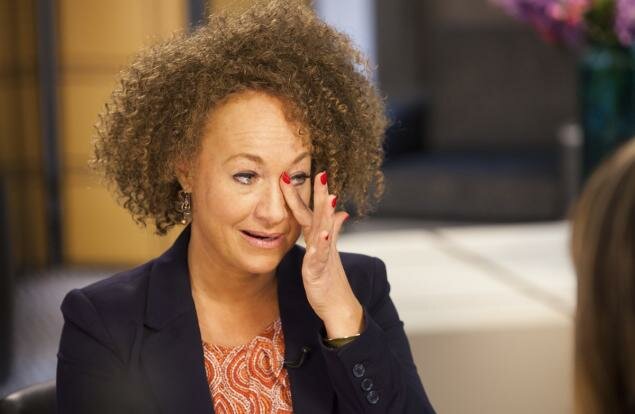
Dolezal’s excuse is that she’s exhausted of having to explain herself – a curious statement from someone who has done very little explaining beyond broad statements intended to smooth over glaring inconsistencies.
She’s back! Just when you thought you had heard the last of Rachel Dolezal, the white woman who was busted pretending to be black, she has returned to the headlines with an interview in Vanity Fair.
“From my earliest memories I have awareness and connection with the black experience, and that’s never left me”, she says later – again without clarifying exactly what her “black experience” is and/or has been.
The Vanity Fair shoot features Dolezal rocking blond braids, one of the Black hair styles she learned as a college student in Mississippi, the article reports. “Like I said, I’ve had my years of confusion and wondering who I really (was) and why and how do I live my life and make sense of it all, but I’m not confused about that any longer. I think the world might be-but I’m not”, Dolezal said.
Overnight Rachel Dolezal went from N.A.A.C.P. leader to Internet joke, claiming that though she was born Caucasian, she identified as black.
Since her parents broke the news that Dolezal is not, in fact, of African American descent, she stepped down at the N.A.A.C.P. and was asked to step down as a professor of Africana studies at Eastern Washington University.
A lot of raging people have flung a lot of vitriol at a strong, handsome black woman named Rachel Dolezal. “And that’s simply not true”.
Dolezal said she also has had some informal contact with her former NAACP chapter.
Dolezal said that she felt a book would best return her to the good graces of her fellow activists. Replace “I wouldn’t say I’m African American” with “I wouldn’t say I was born a woman”.
“It’s not a costume”, she told the magazine Sunday. She reveals she has been making money by styling black hair, and that her ex-husband is considering changing their custody agreement to let her leave the Spokane area. Growing up as a white child in Montana, she always chose to color self-portraits with the brown crayon instead of the peach one, she said on the “Today” show in June. But if you’re a white woman who has chosen to defend your earnest blackface as something that’s an inextricable part of your identity, then it might behoove you to figure out something of actual substance to say.
Rachel Dolezal spoke with Matt Lauer about her transracial self-identification.
In her interview with Vanity Fair, she added she believes there is a difference between being black and being African American, the former of which she identifies as. On the other, it’s hard to discredit her arguments without holding an essentializing definition of race.
